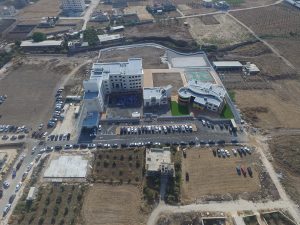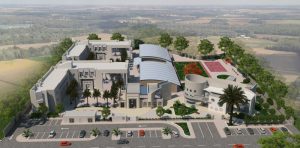Learning a new language can be a lifelong journey. It takes dedication, practice, and, in the case of students at a newly minted technology-focused school in Jenin, Palestine, a working computer or tablet equipped with the latest programming technology.
Al-Jinan International School (JIS) is the first educational institution in Palestine to require students to learn computer coding and programming as a second language. JIS is an information-technology-focused school that offers a diversified educational program featuring instructions on coding, robotics, and simulation software alongside traditional core subjects in the humanities, science, and mathematics. The school, which was inaugurated on August 29, 2018, has 470 students in classes ranging from kindergarten to secondary level.

The coding-language requirement is a core element of JIS’s broader mission to prepare its students for their twenty-first-century careers − and engage in a dynamic economy at home in Palestine. Boosting local talent in emerging and innovative technologies is critical to help Palestine make the transition to a knowledge-based economy. In that sense, JIS, which is part of ongoing public and private-sector-led initiatives to transform Palestine’s education system, is helping to lay the foundations of a sustainable and vibrant economic future.
“We hope that Al-Jinan International School becomes a model for other schools in Palestine,” said Mr. Mohammed Al-Qubbaj, JIS’s principal. “In many ways, our students are helping to define what is possible in Palestine by pushing local education to new heights. Palestine already has a very high literacy and education rate. What is needed are more efforts to take this productive base and expand upon it.”
Literacy rates in Palestine are indeed high, even when compared to developed countries. Recent data from United Nations Development Program puts Palestine’s literacy rate at 96.3 percent, up from just about 85 percent in 1995. But what it means to be literate is changing. Beyond being able to read and write, literacy today requires the ability to utilize technology to analyze problems and find creative solutions − heightening the need to introduce coding, robotics, and other tech into educational institutions.
Fortunately, local investors and experts in Palestine are coming together to translate these ideas into action. In Jenin, a group of local investors, businesspeople, and academics combined forces to establish Al-Jinan Real Estate Investment Company, which has served as the lead investor in Al-Jinan International School. Chaired by Dr. Adli Saleh, the company seeks to establish Jenin as a local leader in science and technology by investing in a new generation of Palestinian scientists, engineers, and technologists and equipping them with the skills they need to thrive.
At the JIS, students are currently settling in to their first months of class − and gearing up for their first round of exams. “I am excited to join JIS and to be part of a new creative system of providing education,” said English teacher Shifa Abu Alrub. “This is a place that explores a child’s greatest potential and creativity.”
Al-Jinan International School will have a tangible local impact in Palestine’s northern Jenin and Qabatiya governorates, where, before the school’s inauguration, private schools only covered 5.1 percent of total market demand. Moreover, with a capacity of nearly 1,200 students, the school is well-positioned to serve northern Palestine’s educational needs well into the future. “We have long been waiting for such a school to emerge in Jenin. Our children have a lot of potential, especially when it comes to technology. I feel that an education at JIS would better equip my child for the requirements of the future,” said a student’s parent, Mrs. Suha Samoudi.
The school is one of several technology and STEAM-focused schools that will be established across Palestine. STEAM uses science, technology, engineering, arts, and mathematics to develop children’s critical thinking skills. Sharakat, the Palestine Investment Fund’s impact platform for agriculture, education, and technology, is proud to be a co-investor in JIS alongside its co-investors in Jenin. Sharakat’s role is to help accelerate the implementation of its partners’ vision, to assist with the institutionalization and governance of the Jinan Holding Company, and to scale up and expand this innovative education initiative into other governorates in Palestine.
Our hope at Sharakat and the Palestine Investment Fund is that this new brand of schooling – which enables students to solve problems, rather than simply learn solutions, by investing in and modernizing Palestine’s educational facilities and offerings − will help put Palestine on a path towards a knowledge-based economy. It is this futuristic vision that guides our work − and our commitment to invest directly in Palestine’s children.



